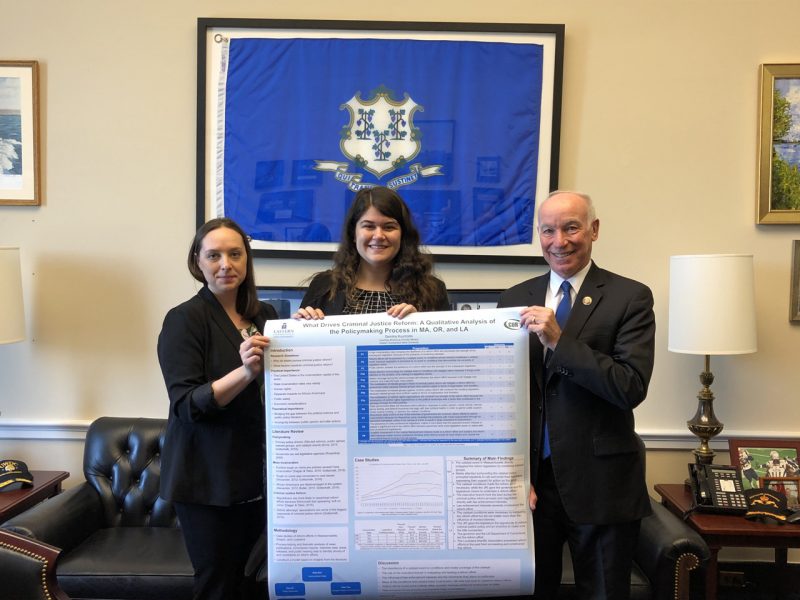


Published on May 09, 2019
 Eastern Connecticut State University student Demitra Kourtzidis ’19 of East Hampton was one of two researchers from Connecticut who presented their projects at the highly selective Posters on the Hill (POH) research conference on Capitol Hill in Washington, D.C. on April 30. The annual event featured 60 representatives from colleges and universities across the nation. Eastern has represented Connecticut eight out of the past 12 years.
Eastern Connecticut State University student Demitra Kourtzidis ’19 of East Hampton was one of two researchers from Connecticut who presented their projects at the highly selective Posters on the Hill (POH) research conference on Capitol Hill in Washington, D.C. on April 30. The annual event featured 60 representatives from colleges and universities across the nation. Eastern has represented Connecticut eight out of the past 12 years.
Kourtzidis, a political science major, presented her research poster titled “What Drives Criminal Justice Reform: A Qualitative Analysis of the Policymaking Process in Massachusetts, Oregon and Louisiana.” Her research was completed under the supervision of political science Professor Courtney Broscious.
Each spring, the Council on Undergraduate Research (CUR) hosts the poster session during which a select group of undergraduate students present their research to members of Congress and other invited guests. CUR works to ensure that legislators have a clear understanding of research and education programs that they fund. The organization also encourages participants to discuss the benefits of undergraduate research with their state’s representatives.
Kourtzidis met with Rep. Joe Courtney and a legislative aide to Sen. Chris Murphy. “We talked about the important role that research has played in the quality of my education and about my project itself, an analysis of criminal justice reform efforts,” she said. “We are lucky to have representatives who value higher education and see the clear need for change in our criminal justice systems.”
At POH, Kourtzidis received encouraging feedback from audience members, including professors, students and a legislative aide to Sen. Richard Blumenthal. “Everyone was surprised by the extent to which monied interests and law enforcement agencies impacted criminal justice reform in my cases. This topic is understudied in political science, so it was nice to find out that other scholars value work on this subject.”
Kourtzidis’ study focuses on Massachusetts, Oregon and Louisiana – where incarceration rates, political landscapes and population composition vary widely – to determine the conditions under which each reform effort succeeded. “Louisiana’s reform was modest, because certain economic stakeholders have a lot of power over criminal justice legislation in the state,” explained Kourtzidis. “Oklahoma surpassed them as the state with the highest incarceration rate, but that was already projected to happen without the reform legislation.
“Oregon’s reform has been more successful, but their final reform bill was much more restrictive than the original legislation. They now have the 17th-lowest incarceration rate in the country. Massachusetts went from having the second-lowest incarceration rate to having the lowest incarceration rate. Their reform made some necessary changes, but created new punitive policy. Last year, they underwent another reform effort with fair results.”
Kourtzidis feels that presenting her thesis at the conference was both fun and gratifying. “It was the culmination of so many months of work,” she said. “I was happy to share something that I cared so much about with other people.”
Written by Jordan Corey